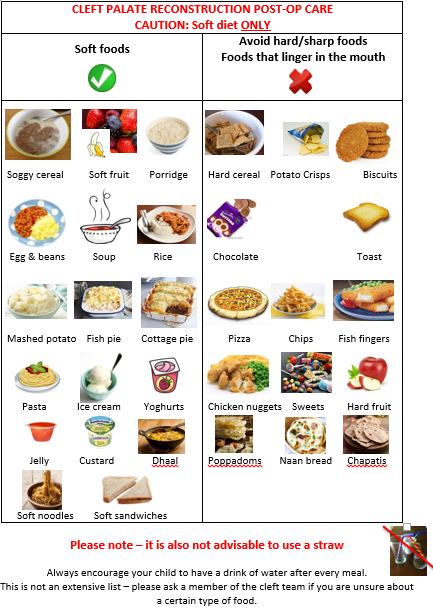DISCHARGE INSTRUCTIONS
What to expect
Your child has had a significant operation inside their mouth and at the back of their throat. They may feel sore afterwards for days to weeks. The amount and duration of pain is variable but is often related to the extent of the surgical maneuvers required during the operation to move and rearrange the tissues. The tissue rearrangement at the back of the throat and presence of dissolvable stitches will feel strange to your child. Encouraging drink and food from an early stage helps your child get used to the new arrangement of their palate and throat. .
It is difficult to get a good view inside the mouth after a pharyngoplasty and we do not advise trying it. However you should not be concerned if you see stitches in the mouth or being spat out in the weeks following the surgery as this is normal as the stitches dissolve away.
Pain control
Give paracetamol and ibuprofen as required for pain. Tender loving care is recommended. Offer frequent small feedings.
Encourage fluids. Give a soft diet as tolerated for 3 weeks after the operation, encourage sips of water after eating to help wash the mouth. Do not allow fizzy drinks or objects to be placed in the mouth (including straws, dummies). Do not give hard foods like toast, biscuits, potato crisps or rusks. Foods such as pureed food, mashed potato, yoghurt, jelly, custard and ice-cream are of an appropriate consistency. Encourage sips of water after eating to help wash the mouth. Please see below for soft diet guide.
Activities
Encourage gentle, quiet activities at home.
Seek medical attention in the event of:
o Increasing pain or pain not relieved by medication
o Persistent fever
o General unwellness
o Poor oral intake
o Bleeding from the mouth or nose
o Difficulty with breathing (especially if choking or stopping breathing for periods when asleep)
Follow up
A review appointment should be made to see a doctor within two weeks; after this you will be seen in our Cleft Clinic in a few months.
If you are unable to keep your appointment please call to reschedule.
If you have any concerns contact:
Pru Talbot, Cleft Co-ordinator - 9345 6595
Plastic & Maxillofacial Surgery Office - 9345 5391
Outpatient appointments - 9345 6180
Plastic Surgery Resident or Registrar - via switchboard on 9345 5522
Soft Diet Guide
